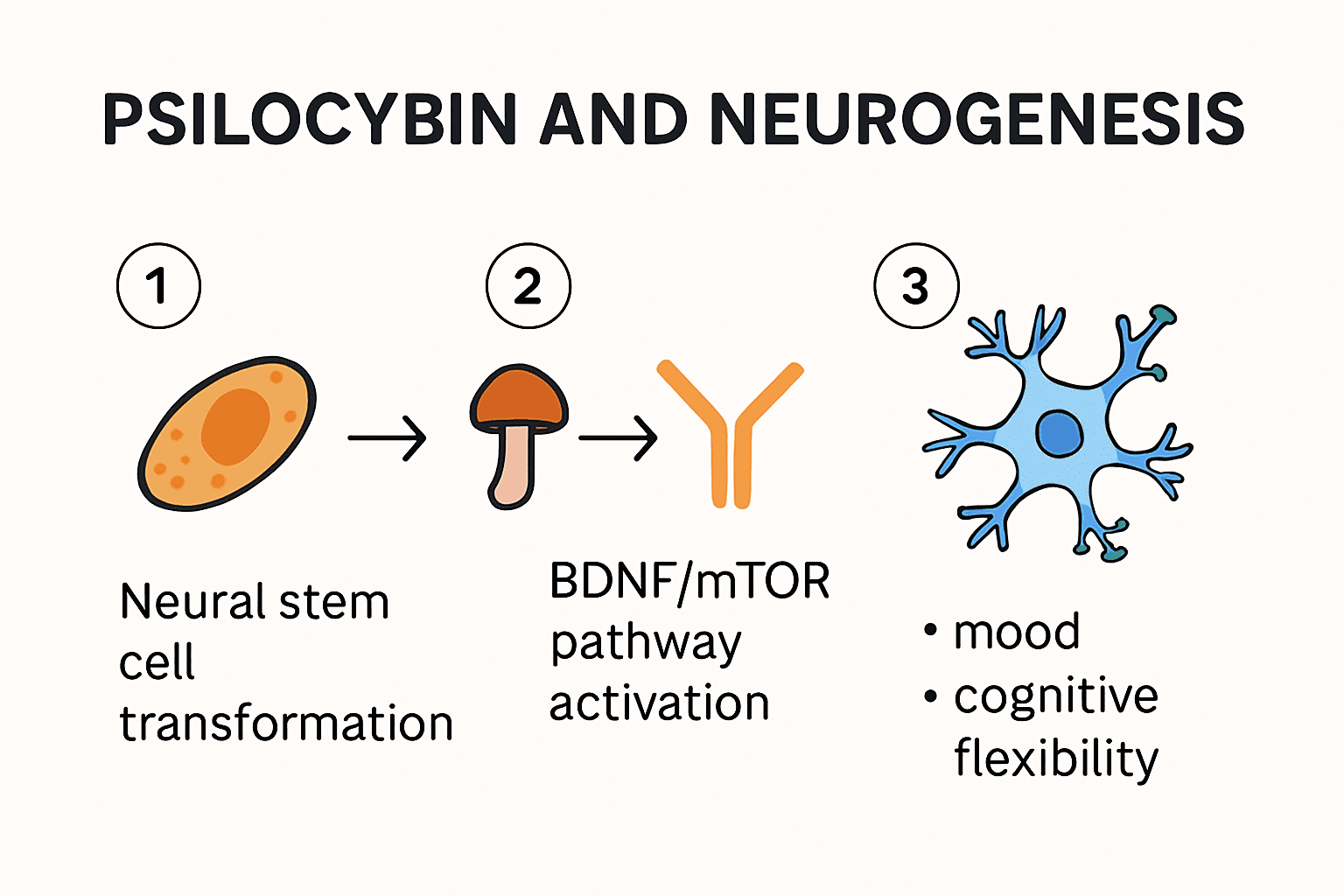Psilocybin may sound like just another mystical compound found in mushrooms and for years that’s all most people believed. But surprise. A single dose of psilocybin can increase connections between brain cells by up to 10 percent, and these changes last for a month or more. This flips old ideas about the brain upside down and points to a new world where your mind can get sharper and more resilient naturally.
Table of Contents
- What Is Neurogenesis And Why It Matters
- How Psilocybin Influences Brain Cell Growth
- Microdosing Psilocybin For Cognitive Support
- Legal Access To Psilocybin In Canada
Quick Summary
| Takeaway | Explanation |
|---|---|
| Neurogenesis enhances brain wellness | New neuron growth can improve mood, learning, and stress resistance. |
| Psilocybin boosts neural connectivity | Single doses of psilocybin can increase connections between brain cells, promoting growth. |
| Microdosing may enhance cognitive performance | Taking small amounts of psilocybin might support creativity and cognitive flexibility without full psychedelic effects. |
| Legal access to psilocybin is evolving in Canada | Recent regulations allow certain patients to access psilocybin with physician guidance for specific conditions. |
| Personalize microdosing approaches for effectiveness | Individual factors, such as mental health history and goals, are key for successful microdosing outcomes. |
What Is Neurogenesis and Why It Matters
The human brain possesses an extraordinary capacity for renewal and adaptation that challenges traditional scientific understanding. Neurogenesis represents this remarkable biological process where new neurons are generated within specific brain regions, offering profound implications for mental health, cognitive function, and overall brain wellness.
The Biological Mechanism of Neural Growth
Neurogenesis is a complex biological mechanism primarily occurring in two critical brain regions: the hippocampus and the subventricular zone. Research from the National Institutes of Health reveals that this process involves neural stem cells transforming into fully functional neurons through intricate developmental stages. These new neurons integrate into existing neural networks, potentially enhancing brain plasticity and cognitive resilience.
The process is not static but dynamically responsive to environmental stimuli, lifestyle factors, and biochemical interactions. Physical exercise, learning experiences, stress management, and specific compounds like psilocybin can significantly influence neurogenesis rates. Neural growth represents more than cellular multiplication it symbolizes the brain’s intrinsic capacity for self regeneration and adaptive learning.
Neurogenesis and Mental Health Implications
Beyond its cellular mechanics, neurogenesis plays a crucial role in mental health and cognitive function. A comprehensive review in the International Journal of Molecular Sciences highlights how promoting neurogenesis can potentially counteract neurodegenerative conditions and support brain repair mechanisms. The ability to generate new neurons throughout adulthood challenges previous scientific assumptions about brain rigidity.
Key implications of robust neurogenesis include:
- Mood Regulation: Enhanced neural growth correlates with improved emotional processing and resilience against depression
- Cognitive Flexibility: New neurons contribute to learning, memory formation, and adaptive thinking
- Stress Resistance: Increased neurogenesis helps mitigate the neurological impacts of chronic stress
Understanding neurogenesis provides a window into the brain’s remarkable capacity for self restoration and adaptation. This biological process underscores the potential for natural interventions to support mental wellness and cognitive health. The emerging research suggests that targeted approaches promoting neural growth could revolutionize our approach to brain health and neurological treatment strategies.
As scientific exploration continues, neurogenesis represents a frontier of human potential. It offers hope for addressing complex neurological challenges and understanding the brain’s extraordinary capacity for renewal and transformation.
How Psilocybin Influences Brain Cell Growth
Psilocybin represents a fascinating natural compound with profound potential to stimulate brain cell growth and neural plasticity. Its unique neurochemical interactions offer unprecedented insights into how psychedelic substances can positively transform brain structure and function.
Neural Structural Transformation
Research published in Neuron reveals extraordinary findings about psilocybin’s impact on neural architecture. A groundbreaking study demonstrated that a single psilocybin dose can trigger rapid and sustained increases in dendritic spine density and size within the brain’s medial frontal cortex. These structural changes occurred within 24 hours and persisted for at least a month, suggesting a powerful mechanism of neural remodeling.
Yale researchers further substantiated these findings, documenting a remarkable 10% increase in neuronal connections in the frontal cortex following psilocybin administration. Such substantial neural growth indicates the compound’s potential to regenerate and enhance brain connectivity.
To help readers understand the main ways that psilocybin positively impacts brain cell growth, the following table summarizes its key structural, molecular, and neurological effects based on the research presented.
| Psilocybin Effect | Description |
|---|---|
| Dendritic Spine Growth | Increases dendritic spine density and size in the medial frontal cortex, strengthening neural connections |
| Enhanced Neuronal Connectivity | Triggers up to 10% increase in connections between neurons, supporting brain network complexity |
| Neurotrophin Activation | Stimulates proteins like BDNF and mTOR, essential for neural growth and neuroplasticity |
| Synaptic Plasticity | Increases flexibility and adaptability of neural connections, aiding learning and recovery |
| Reversal of Stress-Induced Damage | Counters stress-induced reductions in neural complexity and supports brain resilience |
Molecular Mechanisms of Neural Regeneration
Beyond visible structural changes, psilocybin influences brain cell growth through complex molecular pathways. Research in Frontiers in Pharmacology uncovered that psilocybin treatment can reverse stress induced reductions in hippocampal neural complexity. The compound increases expression of critical proteins like brain derived neurotrophic factor (BDNF) and mammalian target of rapamycin (mTOR), which are essential for neuroplasticity.
Key molecular interactions include:

- Neurotrophin Activation: Stimulating proteins responsible for neural growth and survival
- Synaptic Plasticity: Enhancing neural connection flexibility and adaptability
- Stress Resilience: Counteracting neurological damage from chronic stress
Implications for Cognitive and Mental Health
The neural growth triggered by psilocybin extends beyond cellular mechanics, presenting promising implications for mental wellness. By promoting neurogenesis, psilocybin may offer natural support for cognitive function, emotional regulation, and neurological resilience. Learn more about psilocybin’s comprehensive brain health benefits.
These emerging research findings challenge traditional perspectives on brain rigidity, suggesting that targeted interventions can stimulate neural regeneration. Psilocybin emerges not just as a compound, but as a potential catalyst for brain health transformation, offering hope for addressing complex neurological challenges through natural mechanisms.
Microdosing Psilocybin for Cognitive Support
Microdosing psilocybin represents an emerging approach to cognitive enhancement that challenges traditional perspectives on mental wellness and brain performance. This subtle yet potentially transformative method involves consuming minimal quantities of psilocybin to support cognitive function without inducing full psychedelic experiences.
Scientific Perspectives on Microdosing
A comprehensive scoping review of 42 studies explored psilocybin’s nuanced impact on cognitive performance and creativity. Researchers discovered intriguing patterns suggesting that microdoses might enhance creative thinking, though methodological limitations require further investigation. The review highlighted the complexity of assessing cognitive benefits, emphasizing the need for rigorous, long-term research protocols.
Research published in a double-blind, placebo-controlled study provided critical insights into microdosing’s subjective effects. While participants reported noticeable changes in perception, the study cautioned against overstating cognitive improvements, suggesting that individual expectations might significantly influence perceived benefits.
Neurological Mechanisms of Cognitive Support
Psilocybin’s potential cognitive benefits stem from its unique interaction with brain chemistry. A review article examining psilocin’s neurological impact revealed promising mechanisms of action. The compound appears to modulate neural plasticity, decrease overactivity in the default mode network, and potentially provide anti-inflammatory effects that support cognitive function.
Key potential cognitive support mechanisms include:
- Neural Flexibility: Enhancing brain’s adaptive capabilities
- Default Mode Network Regulation: Reducing rigid thought patterns
- Neuroinflammation Reduction: Supporting overall brain health
Practical Considerations and Potential
Microdosing represents a nuanced approach to cognitive support that requires careful consideration. Explore our comprehensive guide to psilocybin’s mental wellness potential for deeper insights into this emerging field.
While early research shows promise, experts emphasize the importance of individualized approaches. Factors such as personal biochemistry, mental health history, and specific cognitive goals play crucial roles in determining potential benefits. Responsible microdosing involves careful dosage management, professional guidance, and a holistic approach to mental wellness.
The frontier of cognitive enhancement through microdosing continues to evolve. As scientific understanding deepens, psilocybin emerges as a potential natural alternative for individuals seeking subtle yet meaningful cognitive support. However, ongoing research remains critical to fully understanding its long-term impacts and optimal application.
Legal Access to Psilocybin in Canada
Canada’s approach to psilocybin represents a nuanced and evolving legal landscape that balances scientific research, medical innovation, and patient care. While psilocybin remains a controlled substance, recent regulatory developments have opened pathways for legal access under specific circumstances.
Regulatory Framework and Legal Pathways
Research published in legal and medical journals reveals that psilocybin is classified as a Schedule 3 controlled substance under the Controlled Drugs and Substances Act (CDSA). However, Canadian regulations provide several critical legal mechanisms for accessing psilocybin:
- Section 56 Exemptions: Allows individual applications for legal use
- Special Access Program (SAP): Enables physician-guided medical treatments
- Clinical Research Protocols: Supports scientific investigation and therapeutic development
Medical and Therapeutic Access Mechanisms
Comprehensive studies highlight the evolution of legal psilocybin access in Canada. The first legal therapeutic uses were granted in August 2020 for individuals with incurable cancer through Section 56 exemptions. Subsequently, the Special Access Program was amended to allow licensed physicians and nurse practitioners to prescribe psilocybin for patients with serious or life-threatening conditions.
Interestingly, investigations into psilocybin markets have revealed a complex landscape where unlicensed stores continue to operate, challenging traditional regulatory frameworks. This situation underscores the growing public interest and demand for alternative therapeutic approaches.
Emerging Regulatory Developments
Recent provincial developments demonstrate Canada’s progressive stance on psilocybin research and treatment. Alberta, for instance, amended its Mental Health Services Protection Regulation to create a structured framework for psychedelic therapy, including psilocybin. Learn more about the current legal landscape to understand the nuanced regulations surrounding this emerging field.
Key considerations for legal access include:
- Consultation with licensed healthcare professionals
- Comprehensive medical assessment
- Understanding individual eligibility criteria
- Adherence to strict regulatory guidelines
The Canadian approach represents a balanced model that prioritizes patient safety, scientific research, and potential therapeutic innovation. While access remains controlled, the regulatory environment continues to evolve, reflecting growing scientific understanding of psilocybin’s potential medical applications.
This table outlines the current ways to legally access psilocybin in Canada, along with their main features, as discussed in the article. It helps clarify the evolving legal framework for patients and researchers.
| Legal Access Mechanism | Who Qualifies | Key Feature |
|---|---|---|
| Section 56 Exemptions | Individuals meeting specific criteria | Personalized legal use exemption granted by Health Canada |
| Special Access Program | Patients with serious conditions | Physician-guided medical access for eligible patients |
| Clinical Research | Approved researchers and studies | Enables scientific investigation under strict protocols |
| Unlicensed Stores | General public (illicit access) | Operate outside regulations; not officially sanctioned |
| Provincial Initiatives | Varies by province (e.g. Alberta) | Local regulatory changes supporting structured therapy |
As research advances and societal perspectives shift, Canada remains at the forefront of exploring psilocybin’s therapeutic potential. Individuals interested in legal access must navigate a complex but increasingly accessible regulatory landscape, guided by medical professionals and emerging scientific evidence.

Frequently Asked Questions
What is psilocybin and how does it affect the brain?
Psilocybin is a naturally occurring compound found in certain mushrooms that can stimulate brain cell growth and enhance neural connectivity. A single dose can increase connections between brain cells, which may lead to improved mood, cognitive function, and emotional resilience.
How does neurogenesis contribute to brain health?
Neurogenesis, the process of generating new neurons in the brain, is vital for brain health as it enhances mood regulation, cognitive flexibility, and stress resistance. It signifies the brain’s ability to adapt and heal, potentially countering neurodegenerative conditions.
What are the potential benefits of microdosing psilocybin?
Microdosing psilocybin, which involves taking small amounts of the compound without inducing full psychedelic effects, may enhance creativity, cognitive flexibility, and overall cognitive performance. It promotes subtle improvements in mental wellness and supports neural adaptability.
What legal pathways exist for accessing psilocybin in Canada?
In Canada, psilocybin can be accessed through various legal pathways, including Section 56 exemptions for individual use, the Special Access Program for patients with serious conditions, and clinical research protocols. The regulatory landscape continues to evolve, providing more opportunities for therapeutic use.
Experience Natural Brain Renewal with Microdosed Psilocybin
Are you seeking a natural way to promote neurogenesis, boost neural connections, or support cognitive wellness? If you resonated with the breakthroughs outlined in our article on psilocybin and brain health, it is time to take the next step. From strengthening brain cell growth to encouraging long-term emotional balance, the science is clear—small actions can lead to big changes for your mind.

Do not wait to explore the advantages of plant-powered wellness. Learn which microdosed psilocybin products might help you unlock mental clarity and sustain cognitive growth. Start your journey at Kind Stranger today for practical solutions, guidance on dosing schedules, and answers to your questions about safe and legal access. Prioritize your brain’s vitality now by discovering how natural support can fit into your wellness routine.
Recommended
- Psilocybin and the Brain: Natural Support for Mental Wellness 2025 • KIND STRANGER
- Psilocybin and Gut Health: Natural Wellness Insights 2025 • KIND STRANGER
- Psilocybin vs Psilocin: Key Differences and Mental Health Benefits 2025 • KIND STRANGER
- Psilocybin and Meditation: Natural Wellness in 2025 • KIND STRANGER


Comments
There are no comments yet.